Related Research Articles

André-Marie Ampère was a French physicist and mathematician who was one of the founders of the science of classical electromagnetism, which he referred to as "electrodynamics". He is also the inventor of numerous applications, such as the solenoid and the electrical telegraph. As an autodidact, Ampère was a member of the French Academy of Sciences and professor at the École polytechnique and the Collège de France.
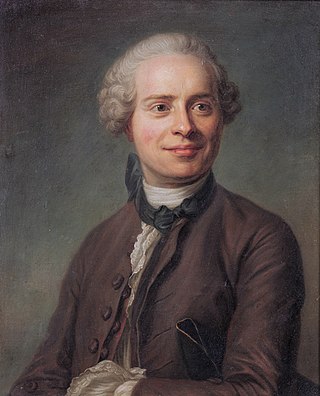
Jean-Baptiste le Rond d'Alembert was a French mathematician, mechanician, physicist, philosopher, and music theorist. Until 1759 he was, together with Denis Diderot, a co-editor of the Encyclopédie. D'Alembert's formula for obtaining solutions to the wave equation is named after him. The wave equation is sometimes referred to as d'Alembert's equation, and the fundamental theorem of algebra is named after d'Alembert in French.

Jean-André Deluc or de Luc was a geologist, natural philosopher and meteorologist from the Republic of Geneva. He also devised measuring instruments.
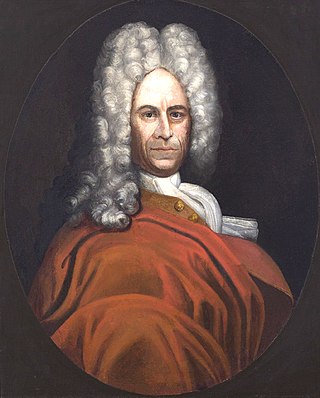
Christian Wolff was a German philosopher. Wolff is characterized as one of the most eminent German philosophers between Leibniz and Kant. His life work spanned almost every scholarly subject of his time, displayed and unfolded according to his demonstrative-deductive, mathematical method, which some deem the peak of Enlightenment rationality in Germany.
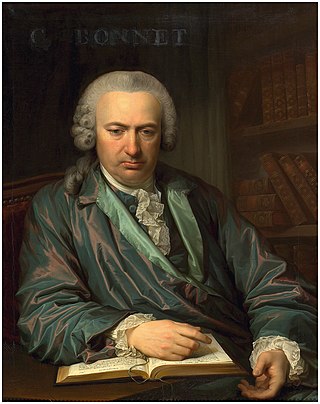
Charles Bonnet was a Genevan naturalist and philosophical writer. He is responsible for coining the term phyllotaxis to describe the arrangement of leaves on a plant. He was among the first to notice parthenogenetic reproduction in aphids and established that insects respired through their spiracles. He was among the first to use the term "evolution" in a biological context. Deaf from an early age, he also suffered from failing eyesight and had to make use of assistants in later life to help in his research.

Horace Bénédict de Saussure was a Genevan geologist, meteorologist, physicist, mountaineer and Alpine explorer, often called the founder of alpinism and modern meteorology, and considered to be the first person to build a successful solar oven.
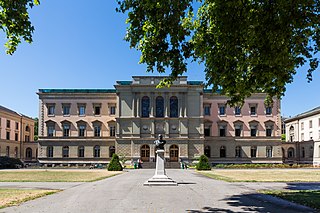
The University of Geneva is a public research university located in Geneva, Switzerland. It was founded in 1559 by French theologian John Calvin as a theological seminary. It remained focused on theology until the 17th century, when it became a center for enlightenment scholarship. Today, it is the third largest university in Switzerland by number of students.
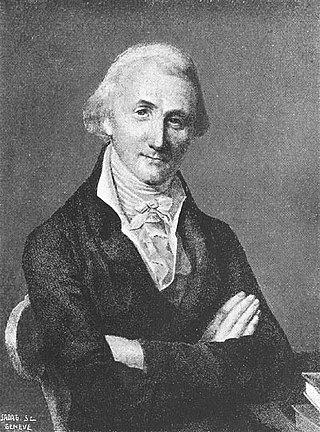
Pierre Prevost was a Genevan philosopher and physicist. In 1791 he explained Pictet's experiment by arguing that all bodies radiate heat, no matter how hot or cold they are.

Gabriel Cramer was a Genevan mathematician.

Michel Gustave Édouard Mayor is a Swiss astrophysicist and professor emeritus at the University of Geneva's Department of Astronomy. He formally retired in 2007, but remains active as a researcher at the Observatory of Geneva. He is co-laureate of the 2019 Nobel Prize in Physics along with Jim Peebles and Didier Queloz, and the winner of the 2010 Viktor Ambartsumian International Prize and the 2015 Kyoto Prize.

Wilhelm Dilthey was a German historian, psychologist, sociologist, and hermeneutic philosopher, who held Georg Wilhelm Friedrich Hegel's Chair in Philosophy at the University of Berlin. As a polymathic philosopher, working in a modern research university, Dilthey's research interests revolved around questions of scientific methodology, historical evidence and history's status as a science.

James Rowland Angell was an American psychologist and educator who served as the 16th President of Yale University between 1921 and 1937. His father, James Burrill Angell (1829–1916), was president of the University of Vermont from 1866 to 1871 and then the University of Michigan from 1871 to 1909.

Abraham Trembley was a Genevan naturalist. He is best known for being the first to study freshwater polyps or hydra and for being among the first to develop experimental zoology. His mastery of experimental method has led some historians of science to credit him as the "father of biology".

Ned Joel Block is an American philosopher working in philosophy of mind who has made important contributions to the understanding of consciousness and the philosophy of cognitive science. He has been professor of philosophy and psychology at New York University since 1996.

Marc-Auguste Pictet was a Genevan scientific journalist and experimental natural philosopher.

The Royal Prussian Academy of Sciences was an academy established in Berlin, Germany on 11 July 1700, four years after the Prussian Academy of Arts, or "Arts Academy," to which "Berlin Academy" may also refer. In the 18th century, when French was the language of science and culture, it was a French-language institution.
Hans Lenk was a German rower who competed for the United Team of Germany in the 1960 Summer Olympics, and an Emeritus Professor of Philosophy. He was born in Berlin.

Jean-Claude Pecker was a French astronomer, astrophysicist and author, member of the French Academy of Sciences and director of the Nice Observatory. He served as the secretary-general of the International Astronomical Union from 1964 to 1967. Pecker was the President of the Société astronomique de France (SAF), the French amateur astronomical society, from 1973–1976. He was awarded the Prix Jules Janssen by the French Astronomical Society in 1967. A minor planet is named after him. Pecker was a vocal opponent of astrology and pseudo-science and was the president of the Association française pour l'information scientifique (AFIS), a skeptical organisation which promotes scientific enquiry in the face of quackery and obscurantism.

Giovanni Francesco Mauro Melchiorre Salvemini di Castiglione FRS was an Italian mathematician and astronomer.

Jacques-André Mallet ; also Mallet-Favre; 23 September 1740 – 31 January 1790) was a Genevan mathematician and astronomer.
References
- 1 2 Jean Trembley, in the Historical Dictionary of Switzerland.
- ↑ Fernando Vidal, « Psychologie empirique et méthodologie des sciences au siècle des Lumières. L'exemple de Jean Trembley », "Archives des Sciences", 57, 2004, pp. 15-35
- An original entry was based on the book A Short Account of the History of Mathematics (4th edition, 1908) by W. W. Rouse Ball.